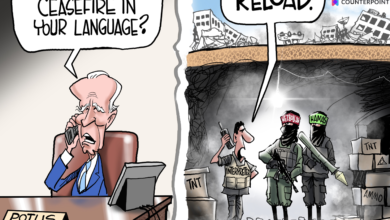CNN’s Fareed Zakaria Does Not Think Highly of America
In response to his blog post stating that Presidential systems were inferior to those with Prime Ministers, CNN’s Fareed Zakaria took to the airwaves to remake his point. The full video is based on a single premise – big government is good.
He spends his entire on air commentary segment saying that since Parliaments are more beholden to the Prime Ministers there is less grid-lock. He fails to understand that slow movement by something as oppressive as a central government was exactly what the founding fathers rightly feared. Imagine if we’d had a parliamentary system in 2009. The health care law would certainly have been single payer, destroying an entire segment of the U.S. economy.
Fareed wrongly believes that if our government could act swifter, surely it could act better. He stakes the claim that since the Prime Minister leads the coalition that runs parliament, he could get more done. What if the legislature is acting irrationally or in our case, not in the best interest of the country?
If more government was truly better, having a legislature going nuts passing all sorts of legislation would be beneficial. The authors of the Constitution knew better and created a framework that creates these adversarial situations on purpose. This grid-lock, slows down the government.
Zakaria is railing against the basis for the three branch framework the founders set up: checks and balances. He would rather have a government run amok upon the people.
While his points make sense to himself and anyone else not afraid to be wholly dependent upon a malignant, power-hungry government – some of us disagree.
Checks and balances are mechanism to prevent tyranny. The President and Congress are not aligned Constitutionally to make sure that even mid-term, the House could be remade to challenge a President grasping at too much power – as happened in 2010. If we go with Fareed’s approach, Obama would would still be passing stimulus bills, taking over companies, wrecking health care, and going after industry. Instead the Constitution has slowed his advance against the American way.
A parliamentary system also allows the legislature to vote out the Prime Minister should they find his politics unhelpful to there agenda – a vote of no confidence. This creates a very cozy relationship between the executive and legislative parts of the government.
In the final portion of Zakaria’s rant on CNN, he let’s us know that he thinks that any thought that we have the greatest system in the history of the world “sounds a lot like thoughtless cheerleading”.




Rich, I think that you’re thinking of Zakaria’s thought experiment in a partisan way rather than in the institutional way that Zakaria meant.
If American operated under a parliamentary system, rather than dividing the executive and the legislature as the current system does, the head of state and head of government would be divided. The US would have to be a republican parliamentary system rather than a Westminster constitutional monarchy, so you would still have an elected President as Head of State, filling a largely ceremonial role, but who could exercise the equivalent of reserve powers. In a republican parliamentary system, the elected President may still veto a bill that passes Parliament, depending on how this hypothetical constitution would be set up.
And even if Prime Minister Obama and his Democratic majority in the House of Representatives passed a health care bill, the Senate would still have to pass it and could make amendments. (Think of the Australian system here).
Even if Prime Minister Obama succeeded in passing his health care legislation, the Democrats would be massively defeated in the next general election three or four years later. Upon the election of a new parliament, the Republicans could form a majority government and then repeal the healthcare bill and restore the status quo.
You are stopping at the idea of a Prime Minister without considering the impact of a coalition, or parliamentary system.
The President, by himself is not the issue. It is the body, the Congress v. Parliament that presents the problem.
You, as would Fareed, would give power to the legislature by removing the check that the President represents. This would push the framework to be progressive in nature – lots of change very quickly. That also assumes that government fixes much of anything. Government is best kept small by having checks on powers in a balanced relationship.
I believe you both misunderstand the intent of the Constitution.
You misunderstand parliamentarism.
Personally, I think this is a setup. It is nothing but an attempt at social engineering in trying to set the stage for getting people so dissatisfied with our government that we will demand a change in our governmental system. The result will be that we will become more like Europe. Exactly what liberals want. Also, it will allow them to push more of their crap onto society.